Romanian Insider: WikiLeaks runs first confidential cable wire from Romania on adoption cases
"WikiLeaks has published the first confidential document sent from the US Embassy in Bucharest to the US. The document, sent in 2006 by the then US Ambassador to Bucharest Nicholas Taubman refers to adoption cases. “On April 5, Embassy received by mail a letter from Theodora Bertzi, Secretary of State for the Government of Romania,s (GOR) Romanian Office for Adoptions (ROA), dated March 29 and including the final report of the GOR Working Group established in June 2005 to audit pending petitions by foreign families to adopt Romanian orphans and abandoned children,” writes the document. “‘The report shows that none of the 1,092 children identified in the pending petitions will be available for inter-country adoption, ostensibly for the following reasons,” the document goes on, further mentioning the reasons."
Read more
The Guardian: WikiLeaks cables claim Russia armed Georgian separatists
"Russia provided Grad missiles and other arms to separatists in South Ossetia and Abkhazia, and carried out a wave of "covert actions" to undermine Georgia in the runup to the 2008 Russian-Georgian war, US diplomatic cables say.
The Kremlin's hostile measures against Georgia included missile attacks, murder plots and "a host of smaller-scale actions", the leaked cables said. Russian secret services also ran a disinformation campaign against Georgia's pro-American, pro-Nato president, Mikheil Saakashvili, claiming he suffered from "paranoid dysfunction"."
Read more
The Globe and Mail: France pressed U.S. on Khadr as Ottawa stood silent: WikiLeaks
"France’s foreign minister asked the United States to consider releasing Omar Khadr from Guantanamo Bay even though the Harper government adamantly refused to intervene, according to leaked U.S. diplomatic cables.
The memo, released by WikiLeaks, shows that Bernard Kouchner, who was French President Nicolas Sarkozy’s foreign minister until three weeks ago, personally asked U.S. Secretary of State Hillary Clinton to review the case in a meeting in February of 2009."
Read more
The Guardian: WikiLeaks cables: Alexander Litvinenko murder 'probably had Putin's OK'
"Vladimir Putin was likely to have known about the operation in London to murder the Russian dissident Alexander Litvinenko, Washington's top diplomat in Europe alleged in secret conversations in Paris.
Daniel Fried, the assistant secretary of state, questioned whether "rogue elements" in Russia's security services could have carried out the hit without Putin's direct approval."
Read more
The Guardian: WikiLeaks cables condemn Russia as 'mafia state'
"Russia is a corrupt, autocratic kleptocracy centred on the leadership of Vladimir Putin, in which officials, oligarchs and organised crime are bound together to create a "virtual mafia state", according to leaked secret diplomatic cables that provide a damning American assessment of its erstwhile rival superpower.
Arms trafficking, money laundering, personal enrichment, protection for gangsters, extortion and kickbacks, suitcases full of money and secret offshore bank accounts in Cyprus: the cables paint a bleak picture of a political system in which bribery alone totals an estimated $300bn a year, and in which it is often hard to distinguish between the activities of the government and organised crime."
Read more
The Guardian: WikiLeaks cables allege Russia bribed Viktor Bout witnesses
"Russia tried to block the extradition of the suspected international arms trafficker Viktor Bout from Thailand to America by bribing key witnesses, the US claims.
Diplomats in Bangkok alleged in cables released by WikiLeaks that Bout's "Russian supporters" had paid witnesses to give false testimony during his extradition hearing."
Read more
The Guardian: WikiLeaks cables: Moscow mayor presided over 'pyramid of corruption'
"The US ambassador to Russia claimed that Moscow's veteran mayor Yuri Luzhkov sat on top of a "pyramid of corruption" involving the Kremlin, Russia's police force, its security service, political parties and crime groups."
Read more
Channel 4: Wikileaks: US memo accuses Sri Lanka President of war crimes
"Channel 4 News uncovers a WikiLeaks cable which appears to show the United States believes responsibility for alleged war crimes in Sri Lanka rests with its leaders, including President Rajapakse.
The cable, released today by whistle-blowing website WikiLeaks, and unearthed by Channel 4 News, was sent from the US Embassy in Colombo on 15 January this year and is headed: 'Sri Lanka war crimes accountability: the Tamil perspective'."
Read more
The Nation: The (Not So) Secret (Anymore) US War in Pakistan
Jeremy Scahill writes: "Despite sustained denials by US officials spanning more than a year, US military Special Operations Forces have been conducting offensive operations inside Pakistan, helping direct US drone strikes and conducting joint operations with Pakistani forces against Al Qaeda and Taliban forces in north and south Waziristan and elsewhere in the Federally Administered Tribal Areas, according to secret cables released as part of the Wikileaks document dump."
Read more
Newsweek: Never Mind Democracy
"WikiLeaks documents reveal how closely U.S. worked with Mideast autocracies despite lofty rhetoric about freedom.
Julian Assange’s data dump has helped confirm that America’s democracy agenda is over. The project of liberating the Middle East from tyrannical regimes and installing free governments was once a centerpiece of the United States’ post-9/11 strategy, but the latest cables released by WikiLeaks reveal a far different reality."
Read more
The Guardian: WikiLeaks cables: Secret deal let Americans sidestep cluster bomb ban
"British and American officials colluded in a plan to hoodwink parliament over a proposed ban on cluster bombs, the Guardian can disclose.
According to leaked US embassy dispatches, David Miliband, who was Britain's foreign secretary under Labour, approved the use of a loophole to manoeuvre around the ban and allow the US to keep the munitions on British territory."
Read more
The Guardian: Wikileaks: US pressured Spain over CIA rendition and Guantánamo torture
"US officials tried to influence Spanish prosecutors and government officials to head off court investigations into Guantánamo Bay torture allegations, secret CIA "extraordinary rendition" flights and the killing of a Spanish journalist by US troops in Iraq, according to secret US diplomatic cables.
Among their biggest worries were investigations pursued by the magistrate Baltasar Garzón, who US officials described as having "an anti-American streak".
"We are certainly under no illusions about the individual with whom we are dealing," they said after he opened an investigation into torture at Guantánamo Bay prison camp. "Judge Garzon has been a storied and controversial figure in recent Spanish history, whose ambition and pursuit of the spotlight may be without rival."
Read more
El País: "Tendremos que ser conscientes de lo que está en juego cuando uno se sienta delante de un funcionario de EE UU"
"Ex diplomáticos españoles celebran que salgan a la luz 250.000 documentos secretos de la mayor potencia del mundo. (Former Spanish diplomats celebrate the coming to lights of 250,000 secret documents belonging to the world's biggest power.)[...]
Máximo Cajal, diplomático retirado que ejerció durante 35 años su oficio, cree que la Casa Blanca, sólo trata de "eludir las muchas responsabilidades que en este tema tiene la Administración Obama, aunque algunas de ellas sean sobrevenidas". "Además, con esas críticas sólo se pretende matar al mensajero". En cuanto a lo que concierne a España, Cajal opina que se deberían extraer algunas lecciones. "Estos documentos ponen al desnudo las presiones confesables y algunas inconfesables a los que están sometidos los llamados países aliados. Los llamados países aliados tendremos que ser más cautos. El jefe de Estado, los ministros, la Magistratura, los fiscales... En el futuro tendremos que ser conscientes de lo que está en juego cuando uno se sienta delante de un funcionario de EE UU. No se trata sólo de que puedan aparecer sus manifestaciones publicadas, como ha ocurrido, sino que uno puede verse sometido a presiones. Hay que ser cauteloso con lo que se dice y con lo que se escucha, porque muchas veces compromete más lo que se escucha que lo que se dice"."
Read more
The Guardian: WikiLeaks cables: US special forces working inside Pakistan
"Small teams of US special forces soldiers have been secretly embedded with Pakistani military forces in the tribal belt, helping to hunt down Taliban and al-Qaida fighters and co-ordinate drone strikes, the embassy cables reveal.
The numbers involved are small – just 16 soldiers in October 2009 – but the deployment is of immense political significance, described in a cable that provides an unprecedented glimpse into covert American operations in the world's most violent al-Qaida hotbed."
Read more
The Guardian: WikiLeaks cables: Pakistani army chief considered plan to oust president
"Pakistan's army chief, General Ashfaq Kayani, considered pushing President Asif Ali Zardari from office and forcing him into exile to resolve a political dispute, the US embassy cables reveal.
Kayani aired the idea during a frantic round of meetings with the US ambassador Anne Patterson in March 2009 as opposition leader Nawaz Sharif rallied thousands of supporters in a street movement that threatened to topple the government."
Read more
Amnesty International: Wikileaks cable corroborates evidence of US airstrikes in Yemen
"A leaked diplomatic cable has corroborated images released earlier this year by Amnesty International showing that the US military carried out a missile strike in south Yemen in December 2009 that killed 41 local residents.
In the secret cable from January 2010 published by the organisation Wikileaks, Yemen's President Ali Abdullah Saleh is reported as having assured US General David Petraeus that his government would 'continue saying the bombs are ours, not yours'.[...]
Amnesty International provided the media with photographs of the aftermath of the Abyan strike in June this year, including remnants of the US-sourced cluster munitions and the Tomahawk cruise missiles used to deliver them. The organization also requested information from the Pentagon about the involvement of US forces in the al-Ma'jalah attack, and what precautions may have been taken to minimize deaths and injuries, but has yet to receive a response.
However, a press report a day after the images were released stated that the USA declined to comment on the strike, saying questions on operations against al-Qa'ida should be posed to the Yemeni government. The US government did not respond to the evidence or comment on the airstrike at the time. In the 4 January cable, General Petraeus is recorded as stating that the attack had only caused two civilian casualties but a subsequent inquiry by Yemeni parliamentarians found that 41 civilians had been killed in the attack."
Read more
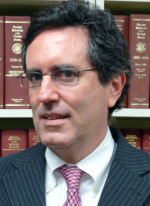
Speaking with Slate magazine's War Room correspondent Justin Elliott, Aftergood said that the DoJ's legal theory for pursuing WikiLeaks and Julian Assange would set "an extremely dangerous precedent."
"This is novel legal territory. Every step involves uncertainty and virgin territory, and ideally it will be left that way," says Steven Aftergood, a secrecy expert at the Federation of American Scientists. Aftergood, who has been a critic of WikiLeaks in the past, argues that "a prosecution of WikiLeaks would be a horrible precedent that in time would almost certainly be applied to other publishers of controversial information."
Elliott writes that "Many have argued that the law (Espionage Act of 1917) is unconstitutional, and, if it was actually applied broadly, would lead to the prosecution of journalists and newspapers that routinely obtain and publish classified national defense information.
'If a case could be made that WikiLeaks did not simply publish the material as a passive recipient, but that they actually solicited the release of the information, then they would be vulnerable,' Aftergood says. But it's not clear how solicitation would be defined, and it's also not at all clear if the facts of the case would bear this theory out. And, again, if this theory of the law were applied, it's hard to see how it wouldn't ensnare a journalist like Bob Woodward, who asks government officials about classified matters and then publishes the information."
Read more
Photo credit: FAS
Carne Ross, Huffington Post: The End of Diplomacy As We Know It
Former UK ambassador to the UN Carne Ross writes: "The presumption that governments can conduct their business in secret with one another, out of sight of the populations they represent, died this week. Diplomats and officials around the world are slowly realizing that anything they say may now be one day published on the Internet. Governments are now frantically rushing to secure their data and hold it more tightly than ever, but the horse has bolted. If a government as technically sophisticated and well protected as the US can suffer a breach of this magnitude, no government is safe. Politicians can demand the prosecution of Julian Assange or -- absurdly -- that WikiLeaks be designated as a terrorist organization, but the bellows of anger are tacit admission that government's monopoly on its own information is now a thing of the past.[...]
There is in fact only one enduring solution to the WikiLeaks problem and this is perhaps the goal of WikiLeaks, though this is sometimes hard to discern. That is that governments must close the divide between what they say, and what they do. It is this divide that provokes WikiLeaks; it is this divide that will provide ample embarrassment for future leakers to exploit. The only way for governments to save their credibility is to end that divide and at last to do what they say, and vice versa, with the assumption that nothing they may do will remain secret for long. The implications of this shift are profound, and indeed historic."
Read more
Max Frankel, The Guardian: WikiLeaks: Secrets shared with millions are not secret
Former New York Times editor Max Frankel writes: "Take it from a Pentagon papers hawk: it's OK to regret the WikiLeaks dump, and to deplore the dumpsters even as you defend, indeed admire, our democratic press and its freedom. It's been 40 years since the New York Times had to defend itself against government censors and threats of prosecution under the espionage acts for publishing a top-secret cache of Pentagon documents tracking the duplicitous path to an unwinnable war in Vietnam.[...]
As Justice Stewart shrewdly observed, the checks and balances governing domestic politics are sadly absent in the realm of foreign affairs. Congress is easily browbeaten into patriotic silence when the war drums roll. Even our courts are thoughtlessly deferential to presidential prerogative when the national interest is invoked. That is why Stewart held that "the only effective restraint upon executive policy and power in the areas of national defense and international affairs may lie in an enlightened citizenry – in an informed and critical public opinion which alone can here protect the values of democratic government".
A wise government would therefore decide – for moral, political and practical reasons – to insist on avoiding secrecy for its own sake. "For when everything is classified, then nothing is classified, and the system becomes one to be disregarded by the cynical or the careless, and to be manipulated by those intent on self-protection or self-promotion ... Secrecy can best be preserved only when credibility is truly maintained."
And here we are at his predicted destination. Lead us secretly into one war too many, and see how we wallow in one or another disclosure too many."
Read more
Robert Scheer, Truthdig: Hillary Gets Wiki-Served
Robert Scheer writes: "Hillary Clinton should cut out the whining about what the Obama administration derides as “stolen cables” and confront the unpleasant truths they reveal about the contradictions of U.S. foreign policy and her own troubling performance. As with the earlier batch of WikiLeaks, in this latest release the corruption of our partners in Iraq and Afghanistan stands in full relief, and the net effect of nearly a decade of warfare is recognized as a strengthening of Iran’s influence throughout the region.[...]
This material refutes the stated anti-terrorist purposes of the two wars we are fighting, and that is the prime reason it is classified. If any of the information was so sensitive, why was none of it labeled “top secret” as is the practice with content that would risk our nation’s security? And why was this vast trove placed in computer systems to which low-ranking personnel had access? The real problem with the release of the dispatches, particularly the kind labeled “noforn,” meaning it shouldn’t be shared with foreign governments, is that it is politically embarrassing — which is why we, the public, have a right to view it. That is certainly the case with the revelation that Secretary Clinton destroyed the once-sacred line between the legitimate diplomat deserving of universal protection and the spies that governments could be justified in arresting.
Instead of disparaging the motives of the leakers, Hillary Clinton should offer a forthright explanation of why she continued the practice of Condoleezza Rice, her predecessor as secretary of state, of using American diplomats to spy on their colleagues working at the United Nations. Why did she issue a specific directive ordering U.S. diplomats to collect biometric information on U.N. Secretary-General Ban Ki-moon and many of his colleagues?"
Read more
Amy Goodman, Truthdig: WikiLeaks and the End of U.S. ‘Diplomacy’
Amy Goodman writes: "Critics argue, as they did with earlier leaks of secret documents regarding Iraq and Afghanistan, that lives will be lost as a result. Rather, lives might actually be saved, since the way that the U.S. conducts diplomacy is now getting more exposure than ever—as is the apparent ease with which the U.S. government lives up (or down) to the adage used by pioneering journalist I.F. Stone: “Governments lie.”[...]
A renowned political analyst and linguist, MIT professor Noam Chomsky helped Daniel Ellsberg, America’s premier whistle-blower, release the Pentagon Papers 40 years ago. I asked Chomsky about the latest cables released by WikiLeaks. “What this reveals,” he reflected, “is the profound hatred for democracy on the part of our political leadership.”"
Read more
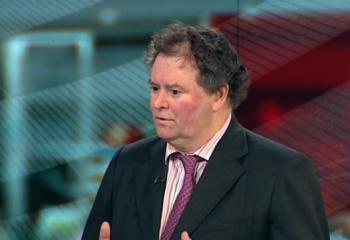
WikiLeaks lawyer and Index on Censorship trustee Mark Stephens was interviewed on BBC about the Cablegate release:
Q: "What do you make of this accusation that it's irresponsible and that it's possibly putting people's lives at risk?"
A: "I think it's fanciful, and the reason I say I think it's fanciful is that the redactions that have been undertaken on this have been done very carefully. A lot of man-hours have been done, they have been cross-checked by the news organizations and the US did also get the opportunity to indicate where they thought that there were problems or lives or operational issues would be put at risk. And indeed, that's the same process that was put in place last time, when the Afghanistan documents were put into the public domain, and the Pentagon spokesman Mr. Lapan, Secretary of State for Defence Gates and NATO officials in Afghanistan all said that they could find not a single example of a person's life being put at risk as a result of that. So I think that the allegations clearly were there, I think, to distract attention from the major issues of huge public importance, which I think ultimately, in the long run, that's what the Americans are concerned about, and that's what many other states who are criticized in these cables [are concerned about], because it would be wrong to say this is anti-American. There are many other state actors, particularly the Russians, who don't come out of this very well at all."
Greg Barns, director of the Australian Lawyers Alliance, writes for ABC News on the Australian government's decision to look into criminal charges against Julian Assange:
"Mr. McClelland’s decision amounts to little more than posturing. This is because Mr. Assange would appear to have committed no crime under Australia’s suite of laws on disclosure of sensitive state information.
The reality is that the Australian Federal Police can do nothing about an Australian citizen who is running a website out of Sweden which is the repository for American diplomatic cables. And Australia, unlike the UK, does not have an official secrets law. It has scattered throughout the Commonwealth statute books provisions relating to the unauthorised disclosure of information that relates to national security by employees, contractors and the like.
In any event, the current legal thinking in the UK and other common law countries is that leaking sensitive information per se is not necessarily an offence. The law respects the right to freedom of expression and simply because the leaked material embarrasses a government does not mean that a criminal offence has been committed.[...] The Gillard government and the Coalition also need to tread carefully in wanting to strip Mr Assange of his passport simply because they do not like the fact that he is embarrassing an ally.[...]
Julian Assange is an Australian citizen who does not deserve to be harassed by the Australian government, he has done nothing wrong."
Read more
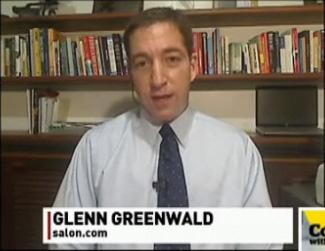
Glenn Greenwald was interviewed earlier today on CBC's Connect with Mark Kelley about WikiLeaks, Julian Assange, the US government and media reactions to Cablegate, and calls to prosecute Assange:
"His whole life has basically been sacrificed on the altar of trying to bring some accountability and some transparency to these powerful people - that's supposed to be the job of journalists, and yet they seem to be quite hostile to someone like him, who's actually doing it.[...]
What ends up happening in American political culture is that most citizens, and especially the established media are essentially identifying with and getting too close to political power - they're supposed to be adversarial to political power, they're supposed to be on the outside, watching over them, prevent them from engaging in wrong-doing, and instead they come to rely upon them for access, for their sources, for their exclusives, and they come to identify with the very people and political office that they're supposed to be monitoring. And so when somebody [who] is truly adverse to political power, which is what Julian Assange and WikiLeaks are, emerges, [what happens] is that these media figures, instead of identifying with the values of disclosure and journalistic exposure and bringing about checks and accountability, instead they identify with the political class into which they've essentially been merged, and the reactions between political figures and media figures are basically the same: everybody is angry and offended at the fact that somebody would inform the American citizenry about what the United States government is doing. It's really extremely bizarre, it's not surprising that the government wants to keep secrets, but to watch the media volunteer to be the leaders, the crusaders on behalf of government secrecy is really quite warped, and reflective of something that's gone very wrong in the American media.[...]
He (Assange) is absolutely a hero, and what's particularly bizarre about it is you hear certain members of the press calling for him to be prosecuted, but the only theories that would allow him to be prosecuted would be the same theories that could easily imprison large numbers of journalists. I mean, the Bush administration actively considered imprisoning or prosecuting the New York Times reporters who revealed that President Bush was illegally spying on Americans in violation of the law. Those are the same theories that they're now calling on to be invoked in order to prosecute Julian Assange for publishing secrets that he got his hands on. They seem to not know or not care that if that actually happens, the ones that would be most jeopardized would be them, at least the few of them who are actually doing investigative reporting."
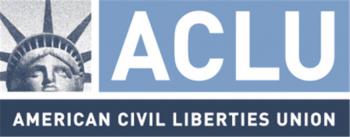
The American Civil Liberties Union has issued a statement on WikiLeaks and the Cablegate disclosures:
"The WikiLeaks phenomenon — the existence of an organization devoted to obtaining and publicly releasing large troves of information the U.S. government would prefer to keep secret — illustrates just how broken our secrecy classification system is. While the Obama administration has made some modest improvements to the rules governing classification of government information, both it and the Bush administration have overclassified and kept secret information that should be subject to public scrutiny and debate. As a result, the American public has had to depend on leaks to the news media and whistleblowers to know what the government is up to.
Without whistleblowers such as WikiLeaks who disclosed illegal activity, we wouldn’t know, among other things, about:
* the CIA’s secret overseas prisons
* the National Security Agency’s warrantless wiretapping program
* that civilian casualties from the war in Iraq are much higher than was thought
* that U.S. troops were going into battle without adequate body armor
There is certainly a narrow category of information that the government should be able to keep secret in order to protect national security and for other purposes. But the reality is that much more information has been classified by the U.S. government than should be, and information is often classified not for legitimate security reasons, but for political reasons — to protect the government from embarrassment, to manipulate public opinion or even to conceal evidence of criminal activity. When too much information is classified, it becomes more and more difficult to separate the information that should be made public from the information that is legitimately classified.
What the WikiLeaks phenomenon means in the longer term — and how the government will respond — is still open to question. But two things are already clear. First, to reduce incentives for leaks, the government should provide safe avenues for government employees to report abuse, fraud and waste to the appropriate authorities and to Congress. Second, the Obama administration should recommit to the ideals the president invoked when he first came to office: “The government should not keep information confidential merely because public officials might be embarrassed by disclosure, because errors and failures might be revealed, or because of speculative or abstract fears.”
Democracy, after all, depends on transparency. The American public has a right to know what the government is doing in its name."

In an interview with TIME, the full recording of which will be made available later according to the magazine, Julian Assange said that "[Hillary Clinton] should resign if it can be shown that she was responsible for ordering U.S. diplomatic figures to engage in espionage in the United Nations, in violation of the international covenants to which the U.S. has signed up. Yes, she should resign over that."
He mentioned that the documents "are all reviewed, and they're all redacted either by us or by the newspapers concerned," adding that WikiLeaks "formally asked the State Department for assistance with that. That request was formally rejected."
He added that "This organization practices civil obedience, that is, we are an organization that tries to make the world more civil and act against abusive organizations that are pushing it in the opposite direction," and that ""It's very important to remember the law is not what, not simply what, powerful people would want others to believe it is. The law is not what a general says it is. The law is not what Hillary Clinton says it is."
Read more
Update: The full interview transcript and audio are now availabe on the TIME website.
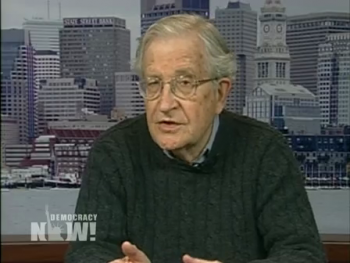
Democracy Now! featured earlier today interviews with MIT Professor Emeritus Noam Chomsky and The Guardian's Investigations Executive Editor David Leigh on WikiLeaks and the Cablegate revelations.
You can watch part one and part two of the interview with Noam Chomsky, and the full interview with David Leigh on the Democracy Now! website.
Commenting on requests that WikiLeaks should be declared a terrorist organization, Noam Chomsky, who helped Daniel Ellsberg make public the Pentagon Papers, said: "I think that is outlandish. We should understand- and the Pentagon Papers is another case in point- that one of the major reasons for government secrecy is to protect the government from its own population. In the Pentagon Papers, for example, there was one volume- the negotiations volume- which might have had a bearing on ongoing activities and Daniel Ellsberg withheld that. That came out a little bit later. If you look at the papers themselves, there are things Americans should have known that others did not want them to know. And as far as I can tell, from what I’ve seen here, pretty much the same is true. In fact, the current leaks are- what I’ve seen, at least- primarily interesting because of what they tell us about how the diplomatic service works."
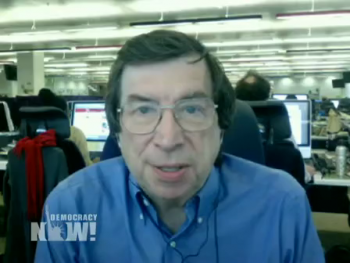
"I think we should pay attention to what we learn from the leaks. What we learned, for example, is kinds of things I’ve said. Perhaps the most dramatic revelation, or mention, is the bitter hatred of democracy that is revealed both by the U.S. Government – Hillary Clinton, others – and also by the diplomatic service," he added.
David Leigh said that "These revelations aren’t over yet. In fact, they’ve barely started. We at the Guardian and the other international news organizations will be making revelations, disclosures from now, day-by-day, for probably the next week or more. So, we haven’t seen anything yet, really.[...] In the coming days, we are going to see some quite startling disclosures about Russia, the nature of the Russian state, and about bribery and corruption in other countries, particularly in Central Asia. We will see a wrath of disclosures about pretty terrible things going on around the world."
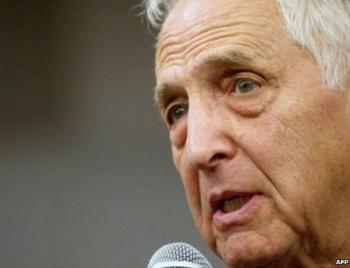
Daniel Ellsberg, in an interview with the BBC News Service, disagreed with US Secretary of State Hillary Clinton's statement that the latest leaks could endanger lives. "That's a script that they role out every time there's a leak of any sort," he said. It is not leaks, but "silences and lies" that put peoples' lives in danger, he believes.
Daniel Ellsberg Photo credit: AFP
(Part 1 of this coverage series is available here.)
US Attorney General Eric H. Holder, Jr. said the Justice Department and the Pentagon have launched "an active, ongoing criminal investigation" into WikiLeaks. According to The Washington Post, "Others familiar with the probe said the FBI is examining everyone who came into possession of the documents, including those who gave the materials to WikiLeaks and also the organization itself.[...] Former prosecutors cautioned that prosecutions involving leaked classified information are difficult because the Espionage Act is a 1917 statute that preceded Supreme Court cases that expanded First Amendment protections.[...] But the sources, who spoke on the condition of anonymity because the inquiry is rapidly unfolding, said charges could be filed under the act."
"It is not saber rattling," said Holder. "To the extent there are gaps in our laws, we will move to close those gaps, which is not to say that anybody at this point, because of their citizenship or their residence, is not a target or a subject of an investigation that's ongoing."
But, the Washinton Post notes, "All the experts agreed that it may be difficult for the United States to gain access to Assange, who apparently has avoided traveling to the country. Most nations' extradition treaties exempt crimes viewed as political. 'I can imagine a lot of Western allies would view this not as a criminal act, but as a political act,' said [former federal prosecutor Baruch] Weiss.
White House press secretary Robert Gibbs yesterday said: "WikiLeaks and people that disseminate information to people like this are criminals, first and foremost. And I think that needs to be clear," according to CNET.
CNET also quotes State Department spokesman P.J. Crowley: "We're not going to let what WikiLeaks has done undermine the global cooperation that is vitally important to resolving regional and global security challenges." But Crowley did rule out more aggressive action against WikiLeaks. When asked "is any action going to be taken that could involve" an "extra-legal process such as renditions or a one-way trip for Assange to Guantanamo Bay," Crowley replied: "No."
Former Arkansas Gov. and possible 2012 Republican presidential candidate Mike Huckabee said that, for anyone who provided information to WikiLeaks, "anything less than execution is too kind a penalty," according to The Florida Independent.
Former Alaska Governor Sarah Palin in the meantime urged the US administration to call for a manhunt on WikiLeaks founder Julian Assange that would be carried out with "the same urgency we pursue al Qaeda and Taliban leaders," reports The Huffington Post. She called Assange "an anti-American operative with blood on his hands."
Former Senator Rick Santorum, another possible GOP presidential candidate for 2012, said at a speech in New Hampshire that Julian Assange should be "prosecuted as a terrorist" for posting classified information, according to The Huffington Post.
Republican Senator Lindsey Graham said that "We're at war. I hope Eric Holder, who's a good man, will start showing some leadership here and get our laws in line with being at war," reports CNET. Was he referring to Iraq or Afghanistan? No, the war against WikiLeaks.
In the meantime, the Sydney Morning Herald reports that "a taskforce of Australian soldiers, spies and officials has been formed to pore over 250,000 US files being published by WikiLeaks."
WikiLeaks replied on Twitter: "Australia deploys Taskforce against WikiLeaks http://is.gd/hXB2g help us deploy counter force: http://is.gd/hXGAf "
Let us stop to contemplate for a moment the fact that "terrorism" now includes telling citizens what their own government does, in that very government's words. Let us also note that more than half of the embassy cables concerned are not classified, and that only 6% of them are classified as secret. What the establishment's reactions show is not any actual national security concern, but simply, as Noam Chomsky put it earlier today on Democracy Now!, "a profound hatred for democracy on the part of our political leadership."
Update: Joining the ranks of crazed assassination advocates is Tom Flanagan, advisor to Canadian Prime Minister Stephen Harper, who has called for the assassination of Julian Assange, "by a drone or something," on public television: http://www.youtube.com/watch?v=bqtIafdoH_g
Is incitement to murder not a punishable offence in Canada? These are the people running your governments, world. Take notice.
Watching Hilary Clinton and her cohorts threatening Wikileaks over being “terrorists” and “spies” was a laugh. As always, the comedy ended when I started looking at the amount of people online who bought into it. The propaganda and misinformation has been so complete over the years, it is frightening what people will accept now.
Look at this.
(Part 1 of this coverage series is available here.)
The Economist: In defence of WikiLeaks
"If secrecy is necessary for national security and effective diplomacy, it is also inevitable that the prerogative of secrecy will be used to hide the misdeeds of the permanent state and its privileged agents. I suspect that there is no scheme of government oversight that will not eventually come under the indirect control of the generals, spies, and foreign-service officers it is meant to oversee. Organisations such as WikiLeaks, which are philosophically opposed to state secrecy and which operate as much as is possible outside the global nation-state system, may be the best we can hope for in the way of promoting the climate of transparency and accountability necessary for authentically liberal democracy. Some folks ask, "Who elected Julian Assange?" The answer is nobody did, which is, ironically, why WikiLeaks is able to improve the quality of our democracy. Of course, those jealously protective of the privileges of unaccountable state power will tell us that people will die if we can read their email, but so what? Different people, maybe more people, will die if we can't."
Read more
John Nichols, The Nation: The White House Is Wrong to Claim WikiLeak Harms the Cause of Human Rights
"On Sunday, [White House Press Secretary] Gibbs achieved the rare combination of utter shamelessness and utter shamefulness when he claimed that by releasing classified diplomatic communications "WikiLeaks has put at risk…the cause of human rights."
Reasonable people may debate the way in which WikiLeaks obtains and releases classified documents. But for Gibbs to try and claim that transparency and openness pose broad threats to the cause of human rights—in the face of all of the compromises of US administrations over the past several decades—is intellectually and practically dishonest.[...]
This is the spin that Gibbs and his team have chosen to employ in their effort to attack the ideal of transparency in international affairs. But, let’s be clear, it is merely spin.
There can and should be honest debates about these WikiLeaks in particular, and in general about the approach of those who leak and circulate classified information. But Gibbs is not engaging in such a debate. Instead, he is feigning upset over human rights in order to deflect attention from revelations regarding the backdoor dealings of US administrations—including the current one—that have consciously and consistently diminished the ability of this country to advance the cause of human rights."
Read more
Heather Brooke, The Guardian: WikiLeaks: the revolution has begun – and it will be digitised
"Much of the outrage about WikiLeaks is not over the content of the leaks but from the audacity of breaching previously inviable strongholds of authority. In the past, we deferred to authority and if an official told us something would damage national security we took that as true. Now the raw data behind these claims is increasingly getting into the public domain. What we have seen from disclosures like MPs' expenses or revelations about the complicity of government in torture is that when politicians speak of a threat to "national security", often what they mean is that the security of their own position is threatened.
We are at a pivotal moment where the visionaries at the vanguard of a global digital age are clashing with those who are desperate to control what we know. WikiLeaks is the guerrilla front in a global movement for greater transparency and participation.[...]
This is a revolution, and all revolutions create fear and uncertainty. Will we move to a New Information Enlightenment or will the backlash from those who seek to maintain control no matter the cost lead us to a new totalitarianism? What happens in the next five years will define the future of democracy for the next century, so it would be well if our leaders responded to the current challenge with an eye on the future."
Read more
Israel Shamir, Counterpunch: On Board the Good Ship Cablegate: Assange in the Entrails of Empire
"Tensions run high when you dare oppose the awesome power of the Matrix. These bright, young cyber-warriors are willing to put their lives on the line for us. Will they survive the launch, or will some evil clones round them up and break them down? In any case, spirits are high and the weather is fit for such a daring enterprise: glorious high skies, a brilliant sun, and bright stars to guide us through the restless nights. Whatever happens I shall be forever grateful for these days, for the company of these charming young men and women, and for the inspiration of their charismatic leader. It is impossible not to admire Julian Assange. He is forever kind, quiet, gentle, and even meek; like the Tao, he leads without leading, directs without commanding. He never raises his voice; he hardly needs to speak and the way becomes clear. Our Neo is guided by the ideal of social transparency. Bright light is the best weapon against conspiracies.[...]
It appears that American power peaked in 1990s, and now it has begun to slowly decay. Megaleaks is not so much a cause as a symptom of decline. With any luck, people of good will around the world can work together to gracefully degrade the machinery of foreign domination. Americans have benefited least of all from the violent and intrusive politics of globalism. Heroic figures like Julian Assange lead us toward genuine local control and away from a Matrix-like network of conspiracies.
Read more
Norman Solomon, Common Dreams: WikiLeaks: Demystifying “Diplomacy”
"Compared to the kind of secret cables that WikiLeaks has just shared with the world, everyday public statements from government officials are exercises in make-believe. In a democracy, people have a right to know what their government is actually doing. In a pseudo-democracy, a bunch of fairy tales from high places will do the trick.[...]
The recent mega-leaks are especially jarring because of the extreme contrasts between the U.S. government's public pretenses and real-life actions. But the standard official response is to blame the leaking messengers.[...]
But what kind of "national security" can be built on duplicity from a government that is discredited and refuted by its own documents?"
Read more
Jeff Sparrow, ABC (Australia): Some junk needs to be touched
"If you’re a democrat, it’s a pretty basic principle: the public should know what the government does in its name.
Consider one of the new WikiLeaks revelations. Salon reports that one cable documents a US diplomat "warn[ing] German counterparts against issuing arrest warrants for CIA agents who were involved in the kidnapping of a German citizen, who was brought to Afghanistan and tortured before officials concluded that they had the wrong man".
It speaks volumes of where we’re now at that the newsworthy aspect of the sentence quoted above doesn’t relate to CIA involvement in kidnapping and torture. No, no, that’s old news – merely another tiny facet of the criminality and lawlessness fostered by the secrecy and unaccountability of the Bush administration.
By contrast, the exposure of attempts to bully German officials to abandon a torture investigation goes some tiny way to restoring the notion of a rule of law – you know, that old-fashioned notion that government officials shouldn’t be able to kidnap people with impunity.[...]
With the WikiLeaks cables, we’re not discussing personal modesty. We’re talking about decisions with real implications for a world we all have to live in. No-one wants to see Robert Gibbs naked. But, however embarrassing the US spokespeople might find it, WikiLeaks's enhanced pat-down is a good thing for democracy."
Read more
In an email interview with ABC News, Julian Assange spoke about upcoming embassy cable releases and responded to accusations from the US administration.
"He was undaunted by vows from the U.S. and Australia to prosecute him and said the forthcoming diplomatic cables are aimed at 'lying, corrupt and murderous leadership from Bahrain to Brazil.'
'We're only one thousandth of the way in and look at what has so far being revealed. There will be many more,' he wrote defiantly.
Assange also dismissed a warning today by Secretary of State Hillary Clinton who said the dump of secret documents 'puts peoples lives in danger,' particularly those sources who provided the U.S. with information about abuses in foreign countries.
'U.S. officials have for 50 years trotted out this line when they are afraid the public is going to see how they really behave," Assange said in his email. "The facts are that we wrote to the State Department asking for a list of any specific concerns that might have. They refused to assist, and said they demanded everything, including those documents that revealed abuses, be destroyed.'"
Read more
The internet is slightly annoyed. In the euphoric highs of the weekend, people couldn’t wait for a giant document drop that would bring democracy to the world. But when it arrived, it was the biggest ton of documents we’d ever seen in our lives, formal documents yet, a brain crushing amount of work. So far we have 243 documents, which is not quite 0.1% of what we have to go through in just this batch. For democracy to be permanent, there will be an unending stream of these batches. Finals week, every week.
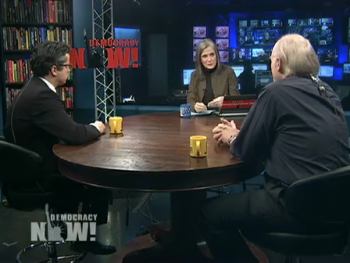
Democracy Now! hosted a roundtable discussion earlier today on the Cablegate revelations, with Pentagon Papers whistleblower Daniel Ellsberg, Greg Mitchell of The Nation, Carne Ross, a British diplomat who resigned before the Iraq war, and As’ad AbuKhalil, a professor of political science at California State University. The discussion was hosted by Democracy Now!'s Amy Goodman.
Daniel Ellsberg responded to Adm Mike Mullen's reiteration of the "WikiLeaks has blood on its hands" line: "First of all, we have Admiral Mullen there who is the interesting position of sending American troops- men and women- into harm’s way. So when it comes to blood on hands, he’s really has got a lot to answer for. From another point of view, he’s quite an expert on that.[...] You can believe that if their plumber’s operation- to the tune of more than 100 men working on this- had been able to find one mutilated body, that one would be on the cover of Newsweek by now. So we’ve had a pretty good test of how well the process of sanitizing these documents by the newspapers- and by WikiLeaks- has operated and the answer is, the proof is in the pudding: No harm has been done; Admiral Mullen’s fears are groundless."
Daniel Ellsberg: "For what it’s worth, we are finding that the big problem with our awful, miserable, incompetent foreign policy in Iraq and Afghanistan is not the fault of foolish, stupid or lying mid-level staffers down below. They are speaking fairly honestly, not with a lot of local knowledge often, but fairly shrewdly in many cases, doing their best job to their superiors. The lying- as in Vietnam- is being enforced by the upper levels. What we need to see, really, is someone following Bradley Manning, or whoever the source is, following his example. He gave what he could- at his twenty-two year old level, corporal’s level, or whatever was available to him- to inform the public. We need somebody with higher access, the kind that I had at that time, and unfortunately didn’t use then, I’m sorry to say, I apologize. But somebody should put out the higher level papers that reveal the high level dealing and stupid formulations, theories, 'mad man' theories and others that are informing our policy so that the American people can begin to get some grip on our incoherent policy and enforce a more humane and productive thrust to it."
Greg Mitchell on the US administration's threats to WikiLeaks: "Joe Lieberman just is the most recent one, quite a detailed call saying this is a national security threat. Peter King said it was the same thing as a military attack, liking it to an attack on the U.S. But so far that hasn’t gotten anywhere and there hasn’t been a serious move to prevent the further dissemination or to stop, as we saw with the Pentagon papers, the actual newspapers printing documents. So we haven’t seen that yet, but we have seen some elegant defenses of publishing the documents, particularly in The Guardian – Simon Jenkins there and in the New York Times note on why the published the documents and they emphasize that it is not the press’ role to keep the government from suffering embarrassment and they also, as he mentioned earlier, the importance of using the example of the false information that was spread about Iraqi WMD’s, that if material like this had come out at that time it would have had a tremendous impact on perhaps halting what became the invasion of Iraq."
The full video is available on the Democracy Now! website.

The New York Times: State's Secrets: Cables Shine Light Into Secret Diplomatic Channels
"A cache of a quarter-million confidential American diplomatic cables, most of them from the past three years, provides an unprecedented look at backroom bargaining by embassies around the world, brutally candid views of foreign leaders and frank assessments of nuclear and terrorist threats.
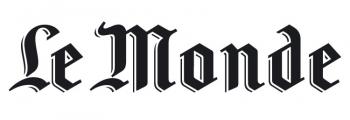
Section front page: http://www.lemonde.fr/documents-wikileaks/
Le Monde: Les révélations de WikiLeaks sur les coulisses de la diplomatie américaine

Der Spiegel - English coverage

El País: Los secretos de la diplomacia de Estados Unidos, al descubierto
Senator Joseph Lieberman, Chairman of the Senate Homeland Security and Governmental Affairs Committee, urges the Obama administration to "shut down WikiLeaks," reports The National Review: "I also urge the Obama Administration — both on its own and in cooperation with other responsible governments around the world — to use all legal means necessary to shut down Wikileaks before it can do more damage by releasing additional cables. Wikileaks’ activities represent a shared threat to collective international security."
As a result of the Cablegate release, New York Republican Peter King, incoming chairman of the House Committee for Homeland Security, has called for WikiLeaks to be classified as a "terrorist organization," reports Sky News: "WikiLeaks presents a clear and present danger to the national security of the United States," he said. "I strongly urge you (Foreign Secretary Hillary Clinton) to work within the Administration to use every offensive capability of the US government to prevent further damaging releases by WikiLeaks."
The Australian government, in the meantime, has started an investigation into WikiLeaks and Julian Assange, reports AP / Washington Post: "Attorney-General Robert McClelland says police are investigating whether any Australian law has been broken by the latest leaking of confidential documents by online whistle-blower WikiLeaks.
McClelland told reporters on Monday he was not aware of a request from the United States to cancel WikiLeaks founder Julian Assange’s Australian passport. He says a range of options are under consideration by Australian government agencies in response to the latest disclosure of classified U.S. material. McClelland says there are “potentially a number of criminal laws” that could have been breached." [Update: the entire text of McClelland's statement is available here]
These statements echo threats made after the Afghanistan and Iraq war logs release by a number of current and former government officials, politicians and pundits. If telling the truth is now considered "terrorism," then the word has lost every meaning it ever had. Is this the world we want to live in? WL Central would like to ask you to support WikiLeaks and stand up for the truth, free speech, a free press, and the right of citizens worldwide to know what their governments are doing in their name. This is not terrorism. This is democracy, at its most basic.
Theme by Danetsoft and Danang Probo Sayekti inspired by Maksimer